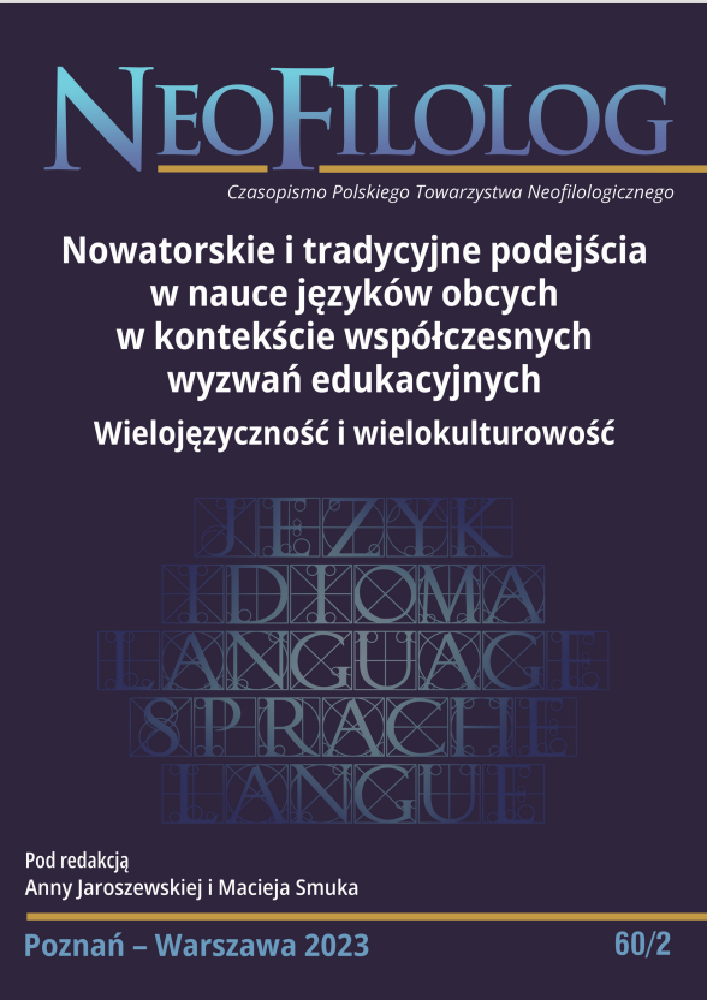Abstrakt
The aim of this article is to present the results of a survey conducted in the academic year 2021/2022 among students of French Philology Studies at the University of Wroclaw. The subject of interest was the role they attribute to out-of-class language learning (including French) in the process of acquiring communicative competence. The question asked was formulated in such a way as to make students reflect on informal learning situations. Qualitative analysis of the answers indicates a relatively broad spectrum of situations of informal learning, which, due to their complexity, require deeper reflection in order to increase the awareness of not only the effects, but also of the process of lifelong learning and the breadth of learning itself. We postulate that language classes in a formal context have as one of their main purposes the stimulation of such reflection and should invite students to undertake various informal learning activities. This in turn increase the effectiveness of formal teaching/learning, and encourages further reflection on the overall foreign language learning process.
Bibliografia
Angrosino M. (2010), Badania etnograficzne i obserwacyjne, tłum. M. Brzozowska-Brywczyńska. Warszawa: PWN.
Benson P. (1997), The philosophy and politics of learner autonomy, (w:) Benson P., Voller P. (red.), Autonomy an independence in language learning. New York: Longman, s. 18–34. DOI: https://doi.org/10.4324/9781315842172-3
Brougère G., Bézille, H. (2007), De l’usage de la notion d’informel dans le champ de l’éducation. „Revue française de pédagogie: recherches en éducation”, nr 158, s. 117–160. Online: http://rfp.revues.org/516 [DW 12.05.2022]. DOI: https://doi.org/10.4000/rfp.516
Czerniawska E. (2005), O złożonych związkach między zdolnościami i metapoznaniem, (w:) Limont W., Cieślikowska J. (red.), Wybrane zagadnienia edukacji uczniów zdolnych, t. 1. Kraków: Impuls, s. 53–73.
Dressman M. (2020), Introduction, (w:) Dressman M., Sadler R. W., The Handbook of Informal Language Learning. Hoboken, NJ: Wiley Blackwell, s. 1–12. DOI: https://doi.org/10.1002/9781119472384.ch0
ESOKJ: Europejski system opisu kształcenia językowego (2003). Warszawa: CODN.
Flavell J. H. (1979), Metacognition and Cognitive Monitoring: A New Area of Cognitive Developmental Inquiry. „American Psychologist”, nr 34 (10), s. 906–911. DOI: https://doi.org/10.1037/0003-066X.34.10.906
Garcia N. de M. D., O’Connor K. M., Cappellini M. (2017), A Typology of Metacognition: Examining Autonomy in a Collective Blog Compiled in a Teletandem Environment, (w:) Capellini M., Lewis T., Rivens Mompean A. (red.), Learner Autonomy and Web 2.0. Sheffield UK/Bristol CT: Equinox Publishing Ltd., s. 67–90.
Grabowska M. (2023), L’apprentissage informel des langues étrangères. Paris: L’Harmattan.
Grabowska M., Zapłotna A. (2021), Samoświadomość metakognitywna w kształceniu sprawności pisania na studiach neofilologicznych. Na przykładzie italianistyki Uniwersytetu Wrocławskiego. „Neofilolog”, nr 57/1, s. 119–133. DOI: https://doi.org/10.14746/n.2021.57.1.8
Jaworska M. (2009), Stopień autonomii uczących się a wpływ „Europejskiego portfolio językowego” na rozwój ich umiejętności autoewaluacji i postrzeganie przez nich pracy z tym narzędziem – studium indywidualnych przypadków, (w:) Pawlak M., Derenowski M., Wolski B. (red.), Problemy współczesnej dydaktyki języków obcych. Kalisz: Wydział Pedagogiczno-Artystyczny UAM w Kaliszu, s. 171–179.
Karpeta-Peć B., Kucharczyk R., Smuk M., Torenc M. (red.) (2014), Wyznaczniki sukcesu nauczyciela i ucznia w glottodydaktyce. Warszawa: Instytut Germanistyki i Instytut Romanistyki Uniwersytetu Warszawskiego.
Landry R., Bourhis R.Y. (1997), Linguistic landscape and ethnolinguistic vitality: An empirical study. „Journal of Language and Social Psychology”, nr 16 (1), s. 23–49. Online: https://www.researchgate.net/publication/247744019_Linguistic_Landscape_and_Ethnolinguistic_VitalityAn_Empirical_Study [DW 12.05.2022]. DOI: https://doi.org/10.1177/0261927X970161002
Łompieś J. (2018), Refleksja metapoznawcza w procesie kształtowania sprawności pisania na poziomie akademickim. "Półrocznik Językoznawczy Tertium, Tertium Linguistic Journal”, nr 3, s. 138–161. DOI: https://doi.org/10.7592/Tertium2018.3.2.lompies
Oliveira Santos D. (2022), Revisiter l’apprentissage informel en articulant des définitions de l’apprentissage par le prisme de la conscience. „Recherches en didactique des langues et cultures”, nr specjalny 20/2, s. 1–15. DOI: https://doi.org/10.4000/rdlc.11305
Pike K. L. (1967), Language in Relation to a Unified Theory of Structure of Human Behavior. La Haye: Mouton. DOI: https://doi.org/10.1515/9783111657158
Schmidt R. (1990), The Role of Consciousness in Second Language Learning. „Applied Linguistics”, nr 11 (2), s. 129–158. [DW 12.05.2022]. DOI: https://doi.org/10.1093/applin/11.2.129
Schugurensky D. (2007), «Vingt mille lieues sous les mers»: les quatre défis de l’apprentissage informel. „Revue française de pédagogie. Recherches en education”, nr 160, s. 13–27. [DW 11.05.2022]. DOI: https://doi.org/10.4000/rfp.583
Schugurensky D. (2000), The Forms of Informal Learning: Towards a Conceptualization of the Field. „WALL Working Papers”, nr 19, s. 1–7.
Sockett G. (2015), La prise en compte des apprentissages informels en didactique des langues étrangères. „Mélangues CRAPEL”, nr 36, s. 127–136.
Sockett G. (2014), The Online Informal Learning of English. Houndmills, Basingstoke: Palgrave Macmillan. DOI: https://doi.org/10.1057/9781137414885
Tough A. (1971), The Adult’s Learning Projects. A Fresh Approach to Theory and Practice in Adult Learning. Toronto: University of Toronto.
Wilczyńska W. (1999), Uczyć się czy być nauczanym. O autonomii w przyswajaniu języka obcego. Warszawa: PWN.
Wenden A. L. (1995), Learner training in context: A knowledge-based approach. „System”, nr 23 (2), s. 183–194. DOI: https://doi.org/10.1016/0346-251X(95)00007-7
Wenden A. L. (1998), Metacognitive knowledge and language learning. "Applied Linguistics”, nr 19 (4), s. 515–537. DOI: https://doi.org/10.1093/applin/19.4.515
Zając J. (2009), Znaczenie metapoznania w rozwijaniu kompetencji uczenia się języka obcego. „Scripta Neophilologica Posnaniensia”, nr X, s. 175–184.
Zdybel D. (2015), Metapoznanie – ukryty wymiar kompetencji uczenia się, (w:) Uszyńska- Jarmoc J., Bilewicz M. (red.), Kompetencje kluczowe dzieci i młodzieży. Teoria i badania. Warszawa: Wydawnictwo Naukowe Żak, s. 54–70.
https://stat.gov.pl/obszary-tematyczne/edukacja/edukacja/ksztalcenie-doroslych-2016,3,3.html. [DW 25.02.2023]
https://www.ore.edu.pl/2015/03/europejskie-portfolio-jezykowe-epj/ [DW 22.02.2023]
https://www.ted.com/talks/sebastien_roger_de_nunez_un_polyglotte_sommeille_en_vous [DW 05.03.2022]
Licencja
Prawa autorskie (c) 2023 Aleksander Wiater, Monika Grabowska

Utwór dostępny jest na licencji Creative Commons Uznanie autorstwa – Bez utworów zależnych 4.0 Międzynarodowe.
Przedstawiany utwór (artykuł) upubliczniany jest na podstawie umowy z autorem i na licencji Creative Commons Attribution-NoDerivatives 4.0 International (CC BY-ND 4.0).
Użytkownicy mają obowiązek podania wraz z rozpowszechnionym utworem, informacji o autorstwie, tytule, źródle (odnośniki do oryginalnego utworu, DOI) oraz samej licencji;
- bez tworzenia utworów zależnych,
- utwór musi być zachowany w oryginalnej postaci.
Uniwersytet im. Adama Mickiewicza w Poznaniu zachowuje prawo do czasopisma jako całości (układ, forma graficzna, tytuł, projekt okładki, logo itp.).

